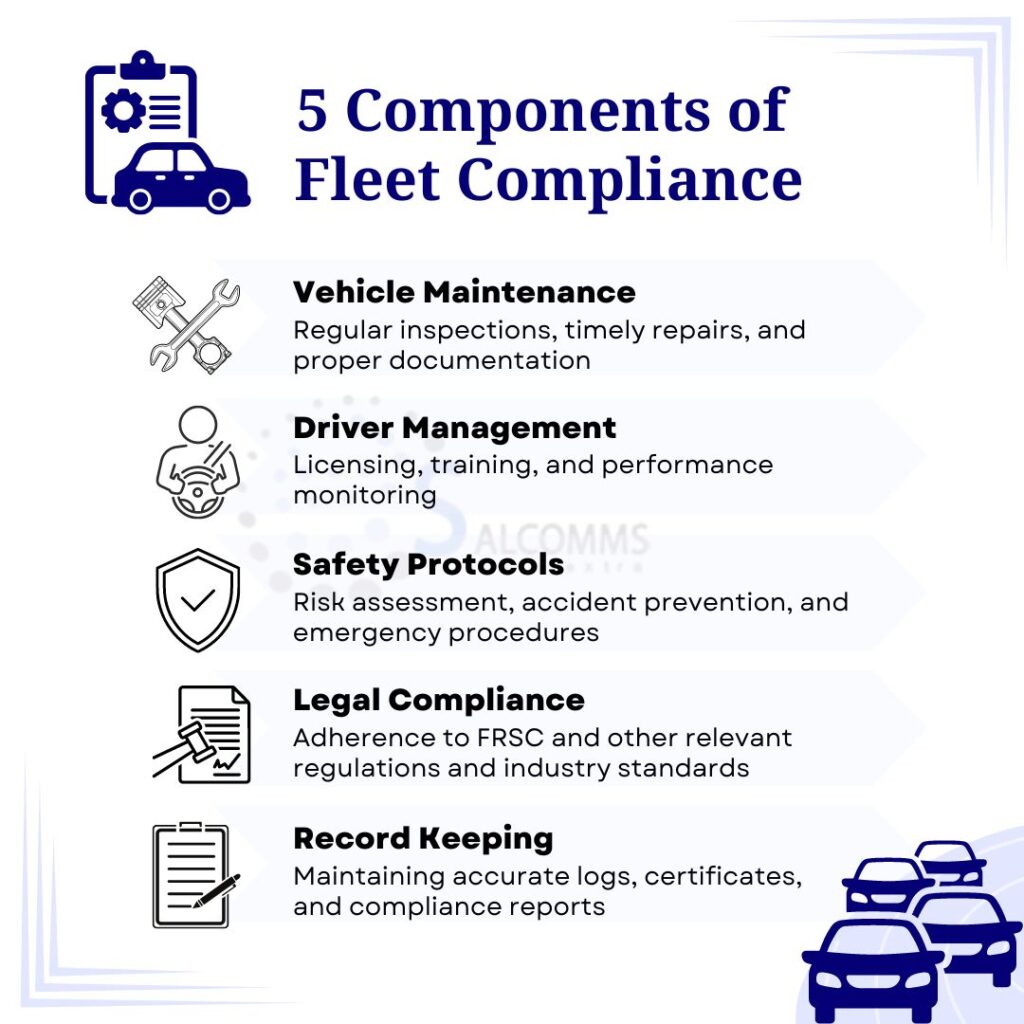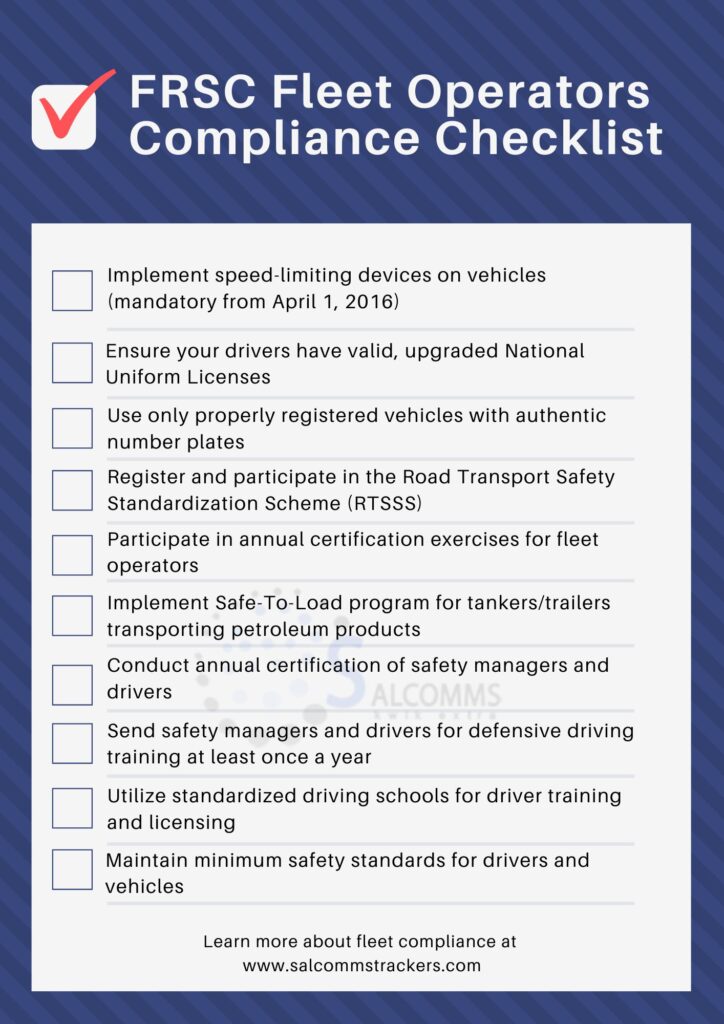Introduction
Fleet compliance is a critical aspect of managing vehicle fleets in Nigeria. It encompasses adhering to various regulations, safety standards, and operational best practices set forth by regulatory bodies such as the Federal Road Safety Corps (FRSC).
And so, for any company or business operating vehicle fleets, understanding and implementing fleet compliance is not just a legal requirement but also a vital component of your operational efficiency and safety.
In this comprehensive guide, we’ll explore the ins and outs of fleet compliance, its importance, and your business can ensure that it meets all necessary requirements.
Key Takeaways
- Ensure legal operation of commercial vehicles in Nigeria through fleet compliance
- FRSC oversees regulations on vehicle inspections, driver qualifications, and safety standards
- By maintaining compliance, you’ll reduce accident risks and boost operational efficiency
- Enhance your company’s reputation through diligent adherence to fleet regulations
- Focus on key areas: vehicle maintenance, driver management, and regulatory adherence
- Implement best practices such as comprehensive safety policies and regular driver training
- Keep detailed records to support your compliance efforts and simplify audits
- Leverage fleet management software and telematics to streamline compliance processes
- Beware: non-compliance can lead to fines, license revocation, and business disruption
- Stay ahead of the curve by regularly updating your knowledge of industry regulations
What Is Fleet Compliance?
Fleet compliance refers to the adherence to laws, regulations, and industry standards that govern the operation of commercial vehicle fleets. It involves a wide range of activities, from vehicle maintenance and driver management to safety protocols and regulatory reporting.
In Nigeria, fleet compliance is particularly crucial due to the country’s unique transportation challenges and regulatory landscape.
Key components of fleet compliance include:
- Vehicle maintenance and inspections
- Driver qualifications and training
- Safety management systems
- Regulatory reporting and documentation
- Legal & Environmental compliance
The importance of fleet compliance in Nigeria cannot be overstated. It not only ensures legal operation but also contributes to road safety, reduces operational risks, and enhances the overall efficiency of fleet management.

Why Fleet Compliance Matters
Legal Implications
Failing to comply with fleet regulations can result in severe consequences for businesses, including:
| Legal Consequences | Financial Impact | Operational Impact |
|---|---|---|
| Fines and penalties | Increased insurance premiums | Vehicle impoundment |
| License revocation | Legal fees | Business disruption |
| Criminal charges | Compensation payouts | Reputational damage |
Safety and Operational Efficiency
Compliance directly correlates with improved safety records and operational efficiency. According to the FRSC, compliant fleets experience fewer accidents, reduced downtime, and lower operational costs.
Impact on Business Reputation
A strong compliance record enhances a company’s reputation, leading to:
- Increased customer trust
- Better relationships with regulatory bodies
- Improved ability to secure contracts and partnerships
Nigerian Fleet Compliance Regulations
The Federal Road Safety Corps (FRSC) is the primary regulatory body overseeing fleet compliance in Nigeria. They have established comprehensive guidelines to ensure the safety and efficiency of commercial vehicle operations.
Key Nigerian laws and guidelines include:
- Vehicle inspections: Regular checks to ensure roadworthiness
- Driver qualifications: Proper licensing and training requirements
- Licensing and permits: Necessary documentation for commercial operations
- Roadworthiness certifications: Mandatory certifications proving vehicle safety
- Emission standards: Compliance with environmental regulations
For detailed information on these regulations, fleet operators can refer to the FRSC’s guidelines for articulated lorries operations in Nigeria.


Businesses Subject to Fleet Compliance in Nigeria
Various types of businesses in Nigeria are required to adhere to fleet compliance regulations:
| Industry | Examples of Businesses |
|---|---|
| Logistics and Transportation | Trucking companies, courier services |
| Delivery Services | E-commerce delivery fleets, food delivery services |
| Construction | Building material transporters, heavy equipment operators |
| Oil and Gas | Fuel tankers, equipment transport vehicles |
These businesses must ensure their fleets meet all compliance requirements to operate legally and safely within Nigeria.
Key Areas of Fleet Compliance
Vehicle Maintenance and Inspection
Proper vehicle maintenance is crucial for fleet compliance. This includes:
- Adhering to regular maintenance schedules
- Conducting thorough pre-trip and post-trip inspections
- Maintaining detailed documentation of all maintenance activities
Learn more about our fleet management solutions that can help streamline your maintenance processes.**
Driver Compliance
Ensuring driver compliance involves:
- Verifying and maintaining proper driver licensing
- Providing ongoing training and education
- Monitoring hours-of-service to prevent fatigue-related incidents
- Implementing health and safety protocols
Safety and Risk Management
A robust safety and risk management strategy is essential for fleet compliance. Key elements include:
- Developing a comprehensive fleet safety policy
- Implementing accident and incident reporting procedures
- Utilizing telematics for monitoring and improving driver behavior
- Creating and maintaining a risk management strategy
Regulatory Compliance
Staying compliant with FRSC guidelines is an ongoing process that involves:
- Regular reviews of current regulations
- Adapting to new requirements as they are introduced
- Preparing for and successfully managing compliance audits
Best Practices for Fleet Compliance
To ensure ongoing compliance, fleet operators should:
- Develop a comprehensive fleet safety policy
- Maintain detailed and accurate records.
- Use fleet management software for tracking and reporting
- Regularly train and educate drivers
- Stay updated with regulatory changes
Tools and Technologies for Ensuring Fleet Compliance
Modern fleet management software offers numerous features to support compliance efforts:
| Feature | Description | Benefit |
|---|---|---|
| Real-time tracking | Monitor vehicle locations and movements | Improved dispatch and route optimization |
| Automated reminders | Alerts for maintenance and inspections | Reduced risk of missed compliance tasks |
| Compliance reporting | Generate reports for regulatory bodies | Streamlined auditing process |
Telematics systems provide additional benefits, including:
- Driver behavior monitoring
- Fuel efficiency tracking
- Vehicle diagnostics
Integrating these tools with other business systems can create a comprehensive fleet management ecosystem that supports compliance efforts across the organization.


Conclusion
Fleet compliance is a critical aspect of running a successful transportation or logistics business in Nigeria. By understanding and implementing the various components of fleet compliance, businesses can ensure they operate safely, efficiently, and within the bounds of the law.
We encourage all fleet operators to prioritize compliance and consider how technology can support their efforts.
Ready to maximize your fleet effiency and ensure compliance?
Start Optimizing Today
Additional Resources
For more information on fleet compliance in Nigeria, consider the following resources:
- Federal Road Safety Corps (FRSC) Official Website
- FRSC Fleet Operators Portal
- Nigeria’s National Environmental Standards and Regulations Enforcement Agency (NESREA)
Recent news articles highlighting the importance of fleet compliance:
- FRSC vows to prosecute fleet operators for safety violations
- FRSC to prosecute fleet operators who violate safety standards
Frequently Asked Questions
What is fleet compliance?
Fleet compliance refers to adhering to laws, regulations, and industry standards governing commercial vehicle fleet operations. It includes vehicle maintenance, driver management, safety protocols, and regulatory reporting.
Why does fleet compliance matter?
Fleet compliance matters due to legal implications, safety considerations, and its impact on operational efficiency. It helps avoid fines, reduces accident risks, and improves a company’s reputation.
What are the key Nigerian fleet compliance regulations?
Key Nigerian fleet compliance regulations include FRSC guidelines on vehicle inspections, driver qualifications, licensing and permits, roadworthiness certifications, and emission standards. These are primarily overseen by the Federal Road Safety Corps.
What businesses are subject to fleet compliance in Nigeria?
Businesses subject to fleet compliance in Nigeria include logistics and transportation companies, delivery services, construction companies, and those in the oil and gas industry. Any company operating a commercial vehicle fleet must adhere to compliance regulations.
What are the key areas of fleet compliance?
Key areas of fleet compliance include vehicle maintenance and inspection, driver compliance, safety and risk management, and regulatory compliance. Each area involves specific requirements and best practices.
What are some best practices for fleet compliance?
Best practices for fleet compliance include developing a comprehensive fleet safety policy, maintaining detailed records, utilizing fleet management software, regularly training drivers, and staying updated with regulatory changes.
What tools and technologies can help ensure fleet compliance?
Tools and technologies for ensuring fleet compliance include fleet management software with features like real-time tracking, automated reminders, and compliance reporting. Telematics systems also provide valuable data for maintaining compliance.